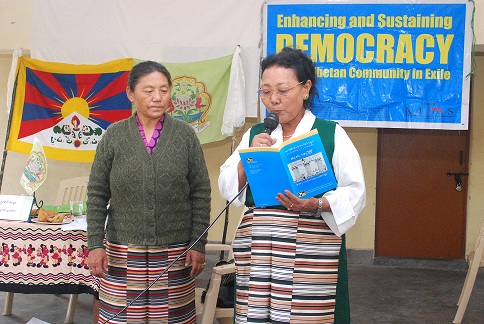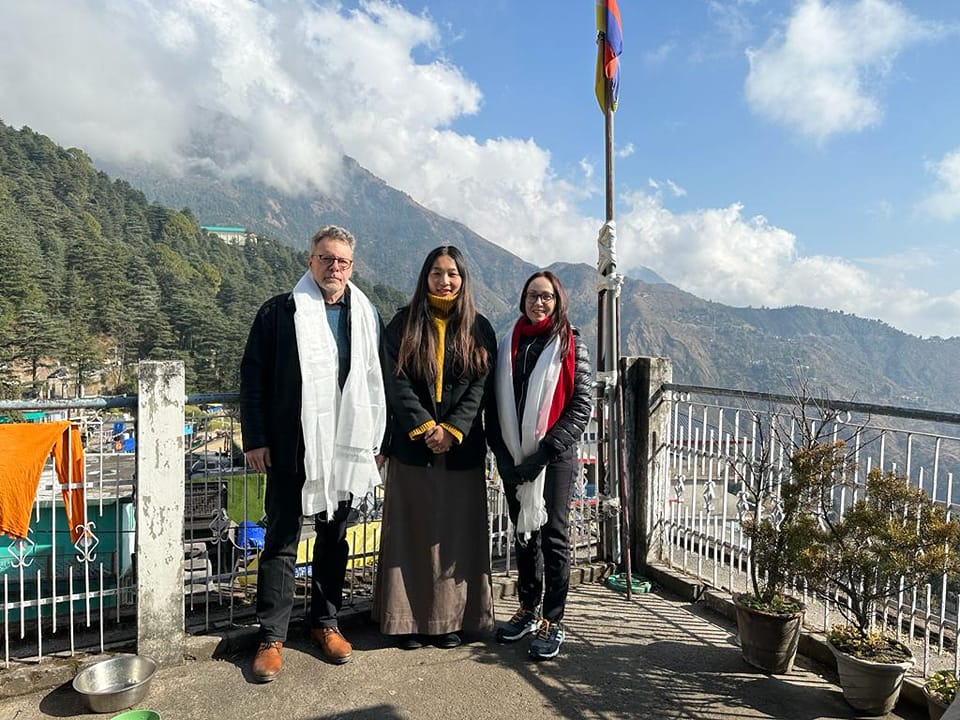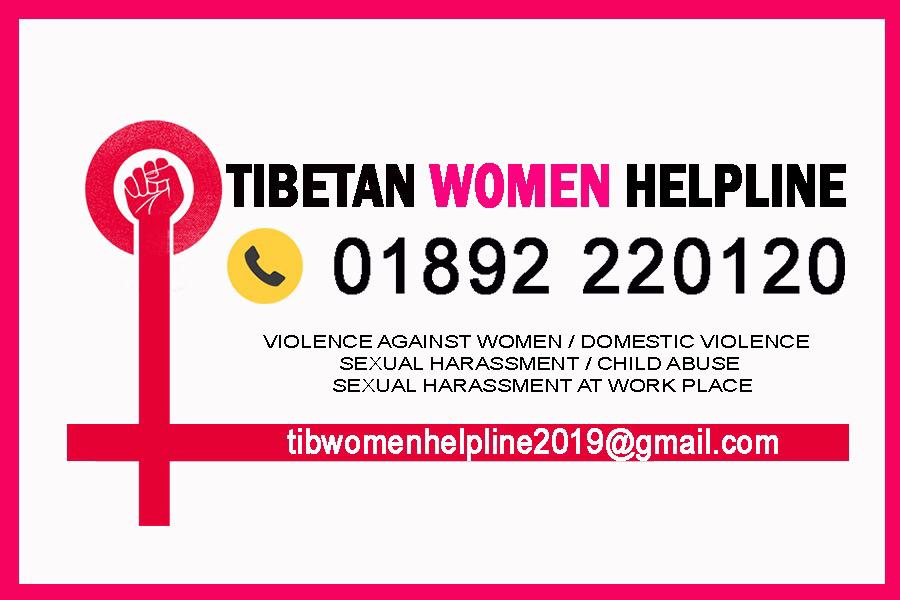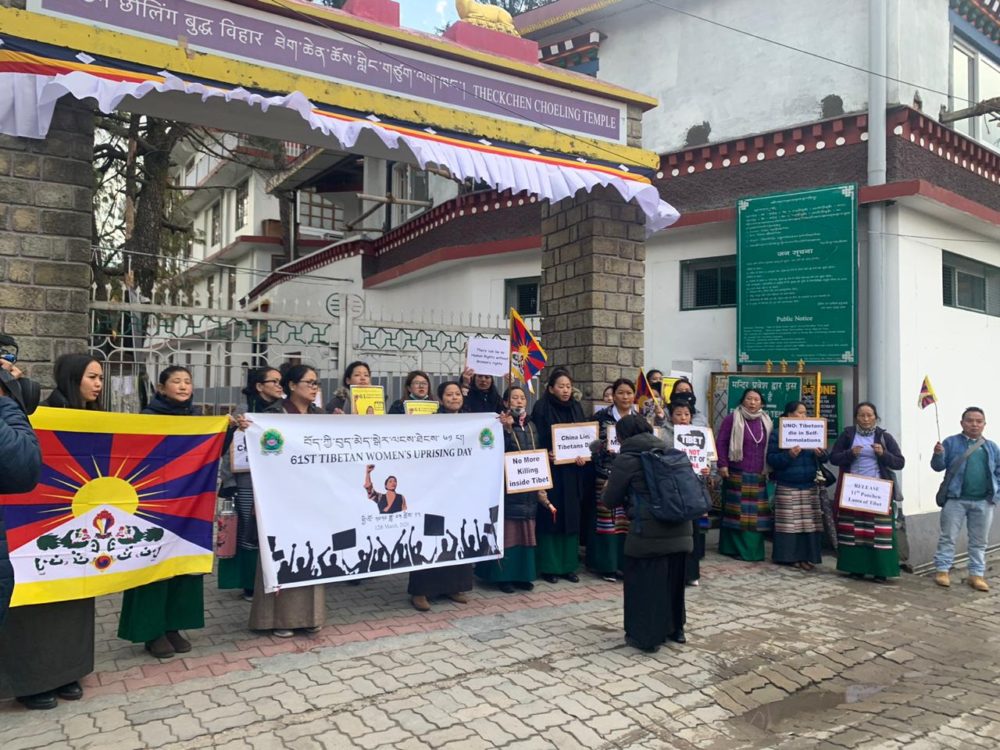TWA undertakes empowerment program to remote Tibetan communities – report
Enhancing and Sustaining Democracy in the Tibetan Community in Exile: an undertaking of TWA’s Empowerment through Action Desk and supported by KIOS, the Finnish NGO for Human Rights.
– a direct outreach and empowerment program in three Asian countries: India, Nepal and Bhutan, to include 37 remote regions of the Tibetan Exile Diaspora.
 Tibetan Women’s Association is proud to inform our readers that TWA’s Empowerment through Action Desk (ETAD) leaders toured and trained 16 Tibetan settlements in India, Nepal and Bhutan. Enhancing and Sustaining Democracy (ESD) in the Tibetan Community in Exile is a project supported by KIOS. The six month project was initiated in October 2010 starting in Nepal, Kalimpong, Gangtok, Darjeeling, Ravangla and Ladakh, with continuation of the project from January to March 2011 which included Bhutan, Meghalaya and Arunachal Pradesh.
Tibetan Women’s Association is proud to inform our readers that TWA’s Empowerment through Action Desk (ETAD) leaders toured and trained 16 Tibetan settlements in India, Nepal and Bhutan. Enhancing and Sustaining Democracy (ESD) in the Tibetan Community in Exile is a project supported by KIOS. The six month project was initiated in October 2010 starting in Nepal, Kalimpong, Gangtok, Darjeeling, Ravangla and Ladakh, with continuation of the project from January to March 2011 which included Bhutan, Meghalaya and Arunachal Pradesh.
BHUTAN: We successfully visited and conducted training on Democracy, Human Rights and Women’s Empowerment at settlements in Bhutan (Khasakha, Kapchisa, Bhoekarna, Hongtso, Jigmenang and Paro) during the month of January 2011.
The Tibetans living in Bhutan had mixed feelings hearing about our arrival in the region. This may in part be due to the political situation currently experienced by the Tibetans in Bhutan. Other possibilities may be caused by feelings of exclusion from the majority populace of exiled Tibetans living in India due to the geographic distance.
Tibetans living in Bhutan were provided the opportunity to cast their vote on March 22, 2011. Many Tibetans were concerned they would not be allowed to cast their votes because during the preliminary election their ballot boxes were confiscated and the preliminary votes were not counted. With so much uncertainty of not being able to exercise their basic democratic right (the right to franchise), the people in Bhutan didn’t seem content. The most difficult part of the training was while travelling to the settlements; our team (President Dolkar Lhamo and ETAD officer Nyima Lhamo) had to masquerade like pilgrims, trying to appear least politically engaged to ensure the security of the lives of the Tibetans living there.
The turnout for the trainings remained low with only 25 – 30 at all the places. Although, during the trainings across the settlements, individuals took time to open up and mingle with TWA representatives. It was the first time in Bhutan that people got to hear or experience an actual training program; we speculate that some of them had their greatest laughs of their life while playing the mind games. Since the difficult political situation for Tibetans in Bhutan started they have hardly had any access to what is happening in the Tibetan communities outside Bhutan. Moreover, the majority of the Tibetans living in Bhutan are senior citizens and many are illiterate. It was a great challenge in teaching them the concepts, the rules, and the regulations related to the election process; but we as trainers and representatives put our best foot forward. Many of them said that they never expected the program could help them so much. In addition, people acknowledged the importance of such training and education.
MEGHALAYA and ARUNACHAL PRADESH: TWA’s joint secretary Tenzin Dolma and ETAD’s staff Nyima Lhamo visited the Tibetan settlements in north east India: Shillong, Tezu, Miao and Tenzinghang in the month of February 2011.
Tibetans living in Shillong are essentially business people (they run shops and restaurants) and they have busy lives. We were extremely impressed with the turnout for the two day program considering the scheduling issues with running a business. The participants were lively, knowledgeable and well informed of the candidates and the process for the upcoming election. In addition, it was interesting to see some young boys and girls educated from non-Tibetan schools take active participation; they aired their views and expressed their willingness to make the best use of their basic fundamental rights. Some of them also confessed that it is the first time they were able to attend a training organised by a Tibetan organization (like TWA) and they were not feeling let down by the program. Some of them claimed that most Tibetans are so involved with their personal needs and greed that this program proved to be a wakeup call to all, reminding everyone about our rights and responsibilities to be exercised.
The Tibetan settlement at Tezu was a beautiful place that embraced us with green scenery all around and bits of moisture due to soft rains. The settlement was easy to maneuvre among, with everything so close and easily accessible. Miao Tibetan settlement embraced us with similar feelings and it was encouraging to see the turnout of people attending the two-day training.
At both these settlements, the most striking thing that sought our attention was when we entered the training venue to find only women participants. We inquired with the regional executives if they sent the invitation to the masses; which included all men to also attend the training. People around there have the misperception that men have nothing to do with a TWA program. The immediate question we had was whether men there vote or not? It was a little sad to see how sometimes our notions or beliefs can affect our choices and limit or restrict ourselves from such empowerment programs due to misperceptions of group involvement. Everything considered, the two day program at Tezu and Miao went well, with the greatest challenge being that the Tibetans spoke more in their regional language (Pemakoepa, Kongpo and others) and spoke less in Tibetan. People hardly showed any gesture or nods of understanding the concepts that we tried to explain throughout the two day program at respective settlements and this kind of worried us. After discussing our concerns with some of the women, we realised that people who live there are so used to speaking to each other in their regional dialect, that they understand Tibetan but do not respond much in Tibetan language. It was a great relief to know they understood us, along with the lecture, group discussion, passage reading and documentary screening.
We were relieved as we breathed in the fresh clean air of Tenzinghang Tibetan settlement, after travelling for more than 24 hours by jeep, bus and Tatasumo from Miao to Tenzinghang. The camps in the settlement were scattered far off from one another. It was great to see an ample number of people attending the two days program at Tenzinghang. People living there spoke in Tibetan and though they are on the far edge of the India map, they seemed more aware about the upcoming election, their basic duty and their right to vote. The Tibetans shared with us and asked questions about the election process; which we hope we were able to satisfy them with our answers and suggestions of their participation in the process.
At places like Tezu, Miao and Tenzinghang, one common concern that most of the people presented was the amount of illiteracy in the community. Most of the people living there were elderly, as the younger population often choose to live and settle outside the settlements, building their careers and lives. Moreover, these settlements struggle with distance and devoid of information of the happenings in the larger Tibetan community; often presenting concerns of marginalization.
BANDARA and MAINPAT: TWA’s president Dolkar Kirti and Women’s Environment and Development Desk (WEDD) staff Tenzin Woebum, visited the Tibetan settlements in Bandra and Mainpat, in the month of February 2011. It was wonderful to see people there taking initiative in attending the training, by arranging transportation means to get the settlers from the far off camps. The turnout of the people was satisfactory. In addition, there were many well educated people among the participants and their positive feedback strengthened the training. Besides the training on Human Rights and Democracy, a special session on Tibet the Third Pole, a TWA environment campaign group started in 2009, was also organized and well received by the people.
BIR: TWA’s vice president and WEDD staff Tenzin Woebum led two day trainings at Bir Tibetan settlement in the first week of February 2011. Although there was low attendance, TWA chose to look at the positive aspects in that, those who attended were well informed and aware of the concepts like Democracy; therefore, they presented the capability of making informed choices.
HIMACHAL PRADESH, UTTARANCHAL AND UTTARKHAND: Three weeks prior to the March 20 election, four members of TWA visited the Tibetan settlements around Himachal Pradesh, Uttarakhand and Uttaranchal.
TWA’s vice president Samten Chodon and ETAD staff Nyima Lhamo toured Choelsum Poanta Sahib, Puruwala, Herbertpur and Mussorrie. We began with Choelsum Poanta Sahib Tibetan settlement with the training on ‘Democracy’. We are thankful to the Settlement Officer and people of Choelsum Poanta Sahib for allowing us to impart the training. There was active participation from the community. In addition, they had lots to share and ask of TWA trainers; it was a very interactive day. Further, at Puruwala Tibetan settlement, the turnout was also satisfactory, with active participation and lots of sharing with interaction from the masses. The community involvement was good and the trainings went smoothly.
TWA’s Joint Secretary Tenzin Dolma and non-standing executive member Tashi Dolma, toured Dickyiling, Clementown, Rajpur and Haridwar and imparted similar training.
Dickyiling trainings had good attendance and the participants were present and interactive. After listening to the people, we felt they were well informed and aware of the developments in our community. The turnout was also good at Clementown (Dhondupling). The screening of the TWA Productions ‘Exile Tibetans Mass Mock Election and its Findings’, a dvd on the importance of the Kalon Tripa and Chithues, proved to be very helpful to a lot of people at the training. Especially the second dvd ‘Promotion of Democracy and Importance of the Election of Kalon Tripa and Chithues’, was very helpful in clarifying much of the confusion which exist in the minds of our people with regards to the election process. Rajpur had 55 people gathered for the day’s program, with very lively participation from the masses. Many of them thanked TWA for coming to the settlement with such an empowering package and stated that this time they will vote with an informed choice.
Finally the “Happy Valley”, Mussorrie and Haridwar were the two places where TWA ETAD concluded the Enhancing and Sustaining Democracy in the Tibetan community in Exile (ESD) project. Both places have Tibetan residence scattered over the towns doing business and they do not have a demarcated settlement area. The attendance at Mussaorrie was satisfactory but Haridwar was small; however, we still believe that the trainings proved beneficial and the people in attendance interacted well. Furthermore, they raised substantial questions and shared their ideas and suggestions.
Conclusion
TWA is happy to have reached out to the Tibetans living in Bhutan, Tezu, Miao and Tenzinghang through the empowerment training. TWA remains thankful to our partner and funder KIOS, the Finnish NGO for Human Rights, for supporting us with the much needed financial help and for making one of our dream project a reality.
TWA’s primary goal is to advocate the rights of the Tibetan women inside Tibet and to empower the Tibetan women in exile. The ETAD exists to strengthen and support the aims of TWA by ensuring that programs are accessible and presented with excellence. The ETAD provides a central point of contact of resources for Tibetan women in exile, while effectively coordinating empowerment programs in culturally appropriate and gender sensitive ways. TWA’s ETAD imparts leadership and empowerment actions which include the Advanced Tibetan Women’s Leadership Training, the Annual Young Tibetan Women’s Leadership Program, the All India Gender Sensitization Training and the Annual Tibetan Nuns Leadership Training.
Feedback from the participants:
“I always wished to see TWA have chapters in Bhutan. I hope it’s not too late to start here. It will be a strong move to bridge the gap between the Tibetan women living inside and outside Bhutan. Thank you for coming to Bhutan.” – Dorjee Gyalpo, 55, Settlement Officer, Bhutan
“Some years ago, I had the opportunity to learn tailoring from ‘Stitches of Tibet’- (an undertaking of TWA), and today I am glad to be of any help and support to TWA. I am sure it will be a wonderful platform to learn and share many new things. Thank you for the empowerment trainings.” – Bhuti, 30, Bhutan
“I am sure that we will not be able to be politically active and engaged, looking at the situation in Bhutan, but then I think this is a wonderful platform to educate myself with the information I get from TWA, and in being able to share it with others will surely give rise to stronger bonding amongst us- the fellow Tibetans.” – Tsamchoe, 38, Bhutan
“I have never been to a training filled with so much freshness; be it the mind games, audio visual presentation and the group discussions. Thank you for coming to Shillong.” – Mrs. Nyepak la, former RTWA President, 55, Shillong, Meghalaya
“My name is Tenzin Pelyoun, I had attended the 2-day workshop which you organized in Jhalupara, Shillong and the reason for me to write to you is to convey my sincere thanks in spreading knowledge about the status of Tibetan women and significantly in igniting a sense of responsibility towards our society which seem to be waning away due to our ignorance and our busy lives. I believe our society, especially the one in Shillong are among the Tibetan societies who are so aloof from the mainstream Tibetan society and therefore we are hardly informed of the important changes taking place in our political, social and cultural scenario.”
“As a youth this is the first Tibetan workshop that I attended and I didn’t felt let down. I wish to thank Tibetan Women’s association for taking the time and initiative to be here and have the patience to bear with our low sense of knowledge. I hope to see more of such works being undertaken by your organization in the near future.” – Tenzin Pelyoun, BSW (Bachelor of Social Work) 2nd yr student, Shillong, Meghalaya.
“People living in and around Dharamsala are often overwhelmed with opportunities and information but it is in these regions like Tezu that people are marginalized and left on the edge. I thank TWA for coming to Tezu and I hope our women will make good use of what they learned from your educative program.” – Settlement officer, Tezu, Arunachal Pradesh
“We are all very happy that you (TWA) came to Tezu and we thank you for that. We request you to come back for a longer period of time, what you shared with us in these two days are very helpful to us. Please come back in future and thank you very much” – Karma, 20, resident of Tezu, Arunachal Pradesh
“Thank you very much TWA for having thought of Miao settlement, thank you for the two days training. I request you to come back every year if possible.” Tenzin Dolma, Miao, Arunachal Pradesh
“Tibetan women’s Association of Tenzinghang would like to thank the central TWA on behalf of all the Tibetans living in our settlement for the valuable training program on Democracy and Gender. We look forward to other similar programs from TWA in the near future.” – Dawa Dolma, 29,Tenzinghang, Arunachal Pradesh
“This training is like giving a walking stick to a blind person” – Mr. Urgen Tenzin, Mainpat, Madya Pradesh
“This is my first workshop and it is very helpful” – Yeshi Choedon, a retired nun in Bandara, Maharashtra
“This workshop conducted by TWA is very helpful but I would like to see youths attending such workshop as it is now high time that our 3rd generation of Tibetans start taking some responsibility”- Choekyap, Bir Tibetan society, Himachal Pradesh.
“I am very proud that TWA is going extra mile to create awareness among Tibetan populace about democracy and how to fill up the form for upcoming election and I am confident that I will make no mistakes this time during the election”- Sangay Sangmo, Bir Tibetan society, Himachal Pradesh
“Being a teacher I have attended many workshops but this one is different. The sessions are very interactive and there is a lot to learn even from the mind-games” – Tashi Dolma, Mussoorie, Uttarkhand
“Thank you TWA for coming to educate and empower the people of my settlement right around the election time.” – Sonam Tsering, Poanta Sahib, Himachal Pradesh
“Very often people limit their choices to the list of candidates listed by the Choelkhas (provinces), this is where we go wrong. We should look beyond it. The government in exile is elected by the people and thus the duty of the government to look after its people.” – Tsultrim Gyatso, 75, Puruwala, Himachal Pradesh
“It is important to encourage the Tibetan women to stand for Chithue or Kalon Tripa’s post. I hope our people will make good use of the things we learned and shared here today.” – Thupten, 69, Herbertpur, Uttaranchal
“I have attended several workshops but this workshop is different and involves lots of interaction and mind- games” – Nyima Dorjee, Deckyiling, Uttarkhand
“Firstly I thank TWA for sending you both here. I feel grateful to have joined this training and thank you for letting us know about Democracy and specially the right to vote and importance of making one’s own choices. A project like this implemented yearly would be wonderful to make our women more brave and to remind them of their rights” – Karma Chodon, 26, Rajpur, Uttarkhand
“We are impressed by the executive members of TWA who imparted empowerment trainings to the residents of our settlement. Consequently, the classes were fruitful and rendered good impact to the entire public who benefited from such wonderful learnings. We appreciate you and congratulate you for that. Thank you.” – the residents of the Dhondupling Tibetan Colony in Clementown, Uttarkhand
“TWA has empowered us about democracy in exile and of the upcoming election of the Kalon Tripa and the members of the Tibetan Parliament. The members of TWA Dharamsala have encouraged us with information and let us know how to participate and elect our leader. We are very thankful to you for showing us the path and for opening our eyes. We will definitely follow your valuable guidance. So, please if you get time then please come and educate, train and empower us again and again.” – the residents of the Tsering Dhonden Tibetan Colony, Uttarkhand.
Also view the photographs on Flickr.
[slickr-flickr search=”sets” set=”72157627608749564″ items=”50″ type=”slideshow” align=”center”]




